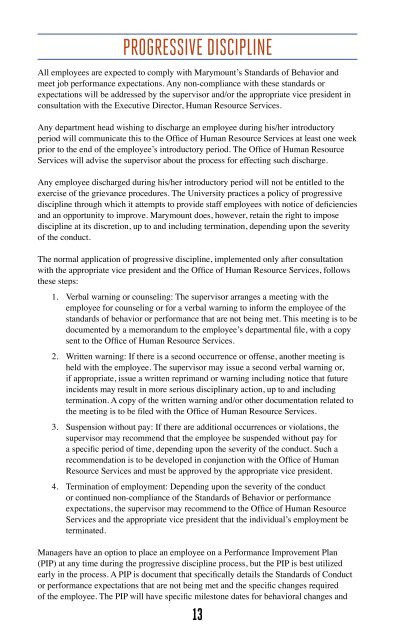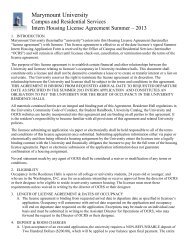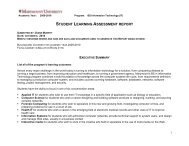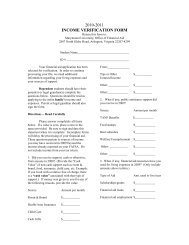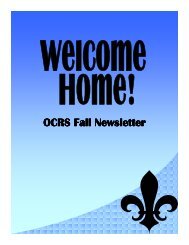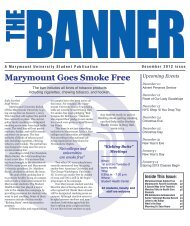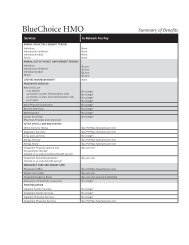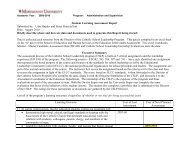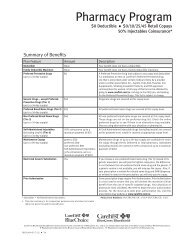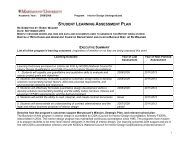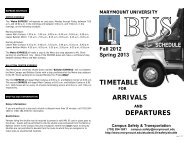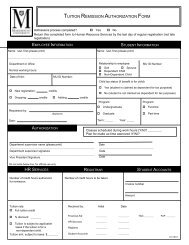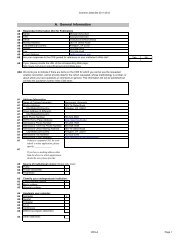EmployEE Handbook - Marymount University
EmployEE Handbook - Marymount University
EmployEE Handbook - Marymount University
Create successful ePaper yourself
Turn your PDF publications into a flip-book with our unique Google optimized e-Paper software.
Progressive Discipline<br />
All employees are expected to comply with <strong>Marymount</strong>’s Standards of Behavior and<br />
meet job performance expectations. Any non-compliance with these standards or<br />
expectations will be addressed by the supervisor and/or the appropriate vice president in<br />
consultation with the Executive Director, Human Resource Services.<br />
Any department head wishing to discharge an employee during his/her introductory<br />
period will communicate this to the Office of Human Resource Services at least one week<br />
prior to the end of the employee’s introductory period. The Office of Human Resource<br />
Services will advise the supervisor about the process for effecting such discharge.<br />
Any employee discharged during his/her introductory period will not be entitled to the<br />
exercise of the grievance procedures. The <strong>University</strong> practices a policy of progressive<br />
discipline through which it attempts to provide staff employees with notice of deficiencies<br />
and an opportunity to improve. <strong>Marymount</strong> does, however, retain the right to impose<br />
discipline at its discretion, up to and including termination, depending upon the severity<br />
of the conduct.<br />
The normal application of progressive discipline, implemented only after consultation<br />
with the appropriate vice president and the Office of Human Resource Services, follows<br />
these steps:<br />
1. Verbal warning or counseling: The supervisor arranges a meeting with the<br />
employee for counseling or for a verbal warning to inform the employee of the<br />
standards of behavior or performance that are not being met. This meeting is to be<br />
documented by a memorandum to the employee’s departmental file, with a copy<br />
sent to the Office of Human Resource Services.<br />
2. Written warning: If there is a second occurrence or offense, another meeting is<br />
held with the employee. The supervisor may issue a second verbal warning or,<br />
if appropriate, issue a written reprimand or warning including notice that future<br />
incidents may result in more serious disciplinary action, up to and including<br />
termination. A copy of the written warning and/or other documentation related to<br />
the meeting is to be filed with the Office of Human Resource Services.<br />
3. Suspension without pay: If there are additional occurrences or violations, the<br />
supervisor may recommend that the employee be suspended without pay for<br />
a specific period of time, depending upon the severity of the conduct. Such a<br />
recommendation is to be developed in conjunction with the Office of Human<br />
Resource Services and must be approved by the appropriate vice president.<br />
4. Termination of employment: Depending upon the severity of the conduct<br />
or continued non-compliance of the Standards of Behavior or performance<br />
expectations, the supervisor may recommend to the Office of Human Resource<br />
Services and the appropriate vice president that the individual’s employment be<br />
terminated.<br />
Managers have an option to place an employee on a Performance Improvement Plan<br />
(PIP) at any time during the progressive discipline process, but the PIP is best utilized<br />
early in the process. A PIP is document that specifically details the Standards of Conduct<br />
or performance expectations that are not being met and the specific changes required<br />
of the employee. The PIP will have specific milestone dates for behavioral changes and<br />
13


